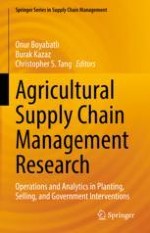2022 | OriginalPaper | Buchkapitel
10. Implications of Farmer Information Provision Policies: Heterogeneous Farmers and Market Selection
verfasst von : Chen-Nan Liao, Ying-Ju Chen, Christopher S. Tang
Erschienen in: Agricultural Supply Chain Management Research
Aktivieren Sie unsere intelligente Suche, um passende Fachinhalte oder Patente zu finden.
Wählen Sie Textabschnitte aus um mit Künstlicher Intelligenz passenden Patente zu finden. powered by
Markieren Sie Textabschnitte, um KI-gestützt weitere passende Inhalte zu finden. powered by
